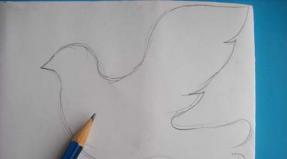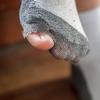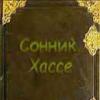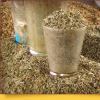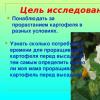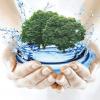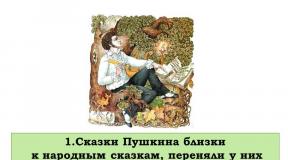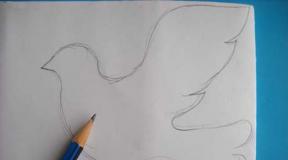Works where there is a reminder of water. Research on the topic “the living image of the sea in the works of Russian writers and poets.” folk expressions with the word water: “A lot of water
Works of art contain inexhaustible opportunities for awakening a child’s cognitive activity, independence, bright individuality, and for the development of speech skills. Therefore, it is necessary to use it as widely as possible in raising children. Reading poems, folk tales, songs, nursery rhymes, accompanied by the display of visual material, more deeply affects the child’s feelings and contributes to memorizing the text.
Download:
Preview:
Card index of works of art about water
Nursery rhymes
There was a fish in the lake,
She came to you and me
We will wash the baby
We will catch fish.
The water is not cold for us.
Where is the fish? Here she is!
Glug, glug, glug, crucian carp.
We wash in a basin.
There are little frogs nearby,
Fish and ducklings.
Water, water,
Wash my face
To make your eyes sparkle,
To make your cheeks blush,
To make your mouth laugh,
So that the tooth bites.
Once upon a time there lived a crucian carp,
And so the fairy tale began.
Once upon a time there were two burbots,
That's half the story.
Once upon a time there were three geese,
That's the whole fairy tale.
Let's roll up our sleeves,
Open the tap - water.
Wash your eyes, wash your cheeks,
Wash your ears and palms!
Look, little ones,
On your palms!
Oh, what palms!
Clean palms!
Voditsa, voditsa,
wash our faces
Wash our cheeks
Wash our lips
Wash our teeth
Wash our hands!
Water, water,
Wash Nastya's face,
Nastya was eating porridge,
Got my face dirty.
So that there is a girl
Always the cleanest
Help, water,
Wash Nastya's face.
We will wash ourselves under the tap,
We are nowhere without water.
Wash your hands, wash your faces
Soap, brush and water.
If you don't like to wash,
Don't sing this song.
Who will be there koop-kup,
Is the water squelch-squish?
To the bath quickly - jump, jump,
In the bathtub with your foot - jerk, jerk!
The soap will foam
And the dirt will go somewhere.
Ay, okay, okay, okay
We are not afraid of water,
We wash ourselves clean,
We smile at mom.
Nobody, nobody, tirlim - bom - bom
Can't guess
Where does the cheerful gnome go?
And the gnome goes for a swim!
We'll go swimming and splash in the water,
Splash, frolic,
Nastya will wash herself.
We will wash our sweet baby's feet,
Let's wash little Nastenka's hands,
Back and tummy, face and mouth -
What a pure dear daughter!
The water is flowing,
Growing child
Water off a duck's back -
The child is thin.
Water downwards
And the child is up.
Cat-cat
Woke up early
He ran to the bridge,
I washed my face white.
I washed my nose, I washed my tail,
And I didn’t forget about the paws.
To make your teeth sparkle,
We rinsed them.
Now a piece of soap
Will help us wash ourselves.
Oh-oh-oh-oh,
Oh, who's naked?
Who went swimming?
Who found some water?
Oh, the water is good!
Good water!
Let's give the baby a bath
May your face shine!
Rain, rain, rain, rain
On me and on people!
A spoonful for people
A little bit for me.
And on Baba Yaga -
Lei a whole bucket!
Wash your nose, wash your cheeks
Mom's chick,
And on a small hook
A towel is waiting for us.
At a forest spring
Two bulls drank water
Drank, drank, got drunk
And they began to butt heads.
Ay, bodu - bodu - bodu!
Oh, now I'm going to fall!
L. Yakhnin
Rain, rain,
Drip-drip-drip!
Wet paths.
We can't go for a walk -
We'll get our feet wet.
Rain, rain, water -
There will be a loaf of bread.
Rain, rain, let it come -
Let the cabbage grow.
Rain, rain, have fun!
Drip, drip, don't be sorry!
Just don't kill us,
Don't knock on the window in vain!
In a small bath
Water is poured
Little Vanya
They wash and wash.
And they grow to the ceiling
White foam clouds,
And the bubbles sparkle
Like colored lanterns.
Rain, rain, harder -
The grass will be greener
Flowers will grow
On our lawn.
Rain, rain, more,
Grow, grass, thicker.
Before you go to bed,
You and I need to wash ourselves.
Wash your eyes, eyebrows, nose,
So that sleep comes to visit us.
Riddle about water
Lives in seas and rivers,
But it often flies across the sky.
How will she get bored of flying?
It falls to the ground again.
(Water cycle in nature)
It's raining, it's raining,
We have been waiting for you for a long time:
With clean water
With silk grass,
With azure color,
Happy warm summer!
Grow, braid, to the waist,
Don't lose a hair.
Grow, little scarf, to your toes -
All the hairs are in a row.
Grow, braid, don’t get confused -
Mom, daughter, listen
Okay, okay,
Wash your sweetie with soap.
Clean palms
Here's some bread and spoons for you.
Riddle about water
They drink me, they pour me out,
Everyone needs me.
Who am I?
(Water)
A fox walked across the bridge,
She was carrying a bundle of brushwood.
I heated the bathhouse,
I bought Vanka,
I planted it in a corner,
Gave me a sweet pie
We will wash with a sponge deftly
Arms, legs and head
Leisya, Leisya, water
Let's always be clean!
Spring is red
She brought us good...
Bread crust
And a glass of water.
A stream runs through the gate
And it hums quietly.
You, my friend, stop
And bow to each other.
(Russian folk jokes, nicknames)
Poems
"Order"
Tap, open! Nose, wash your face!
Wash both eyes at once!
Wash your ears, wash your neck!
Neck, wash yourself thoroughly!
Wash, wash, shower!
Dirt, wash away! Dirt, wash away!
E. Moshkovskaya
Rain
The rain is falling softer, quieter
No longer knocking on the roof
Drip...drip...drip...
The rain has stopped! Hooray!
Glad! Happy kids!
T. Kazakova
Cloud and sun
The cloud covered the sun,
She got our kids wet!
Come on, everyone run here,
I will cover you with an umbrella!
"Who doesn't wash his face"
Who washes his face with hot water?
He's called a good guy.
Who washes his face with cold water?
Called a brave man.
And who doesn’t wash his face -
It's not called at all.
P. Sinyavsky
Ship"
Tarpaulin,
Rope in hand
I'm pulling the boat
Along a fast river.
And the frogs jump
On my heels,
And they ask me:
Take it for a ride, captain!
A. Barto
Fish
The fish swims in the water,
The fish have fun playing.
Fish, fish - mischievous,
We want to catch you.
The fish arched its back
I took a bread crumb.
The fish wagged its tail
The fish quickly swam away.
M. Klokova
Moidodyr (excerpt)
I need to wash my face
In the mornings and evenings
And to unclean chimney sweeps -
Shame and disgrace!
Shame and disgrace!
Long live scented soap,
And a fluffy towel,
And tooth powder
And a thick comb!
K. I. Chukovsky
Neat bunnies
Paws?
Washed.
Ears?
Washed.
Tail?
Washed.
Everything was washed.
And now we're clean
Fluffy bunnies.
G. Lagzdyn
Leika - well done
Watering can, watering can!
Don't skimp on the water!
If it's very hot,
I don't mind the water.
Drink, carrot,
Turnip, drink,
Tomato
And leeks!.. -
And green cucumber
Praises the watering can:
Well done!
V. Lanzetti
The Tale of Tsar Saltan
(excerpt)
The wind blows across the sea
And the boat speeds up;
He runs in the waves
With full sails.
A. S. Pushkin
Ball
Our Tanya cries loudly:
She dropped a ball into the river.
Hush, Tanechka, don’t cry:
The ball will not drown in the river.
Bunny
The owner abandoned the bunny -
A bunny was left in the rain.
I couldn't get off the bench,
I was completely wet.
A. Barto
The girl is grimy
(excerpt)
Oh you dirty girl
Where did you get your hands so dirty?
Black palms;
There are tracks on the elbows.
I was lying in the sun
She held her hands up.
SO THEY GOT TUNED.
A. Barto.
Ship
Tarpaulin,
Rope in hand
I'm pulling the boat
Along the fast river
And the frogs jump
On my heels
And they ask me:
Take it for a ride, captain!
A. Barto.
Winter (excerpt)
White snow, fluffy,
Spinning in the air
And the ground is quiet
Falls, lies down.
I. Surikov
On a sled (excerpt)
The sled rolled down.
Hold on tight, doll!
You, sit, don’t fall, -
There's a groove ahead
You must drive carefully!
Otherwise you might crash!
O. Vysotskaya
Our towels
We are different pictures
We drew them ourselves
Them above the towels
They nailed it themselves.
Olino towel
Sasha won't take it:
He won't be confused with a bird
Blue plane.
Knows his boat
Borya the newbie,
Misha - strawberries,
Mashenka is a top.
Seryozha has an apple,
Volodya has a pear,
And the picture with cherries
I chose Katyusha.
The butterfly is with Igor,
The hare is with Natasha...
We're not confused at all
Our towels!
N. Naydenova
Snow
Snow, snow is spinning,
The whole street is white!
We gathered in a circle,
They spun like a snowball.
A. Barto
Snowball (excerpt)
The snowball is fluttering, spinning,
It's white outside.
And puddles turned
In cold glass.
Z. Alexandrova
Lunch
Raya, Mashenka and Zhenya,
Wash your hands thoroughly
Don't skimp on soap!
I've already set the table.
I supplied everyone with equipment,
I handed out napkins to everyone.
Stop talking -
I poured you some soup.
Knife, fork or spoon
Don't hold it in your fist.
Don't feed the same cat:
Cat bowl in the corner.
Do not dip bread into the salt shaker
And don't push each other.
For the second there will be fish,
And for dessert, compote.
Have you had lunch? Here you go!
What should they say?
Thank you!
E. Blaginina
Bug and cloud
A cloud floated across the sky,
The bug was guarding the house.
Little cloud,
Little Bug.
The cloud turned into rain,
The bug washed itself with the rain.
Little cloud,
Little Bug.
The cloud in the blue sky is melting,
The bug sadly barks after her:
- Goodbye, cloud!
- Goodbye, Zhuchka!
V. Stepanov
Like on a hill - snow, snow
Like on a hill - snow, snow,
And under the hill - snow, snow,
And on the tree there is snow, snow,
And under the tree there is snow, snow.
And a bear sleeps under the snow.
Hush hush. Keep quiet!
I. Tokmakova
Snow bunny
We made a snowball
The ears were made later.
And just
Instead of eyes
We found some coals.
The rabbit came out as if alive!
He has a tail and a head!
For the mustache
Don't delay -
They are made from straws!
Long, shiny,
Definitely real!
O. Vysotskaya
Icicle
When I ate an icicle, -
It was delicious,
And then I got sick, -
It became very sad.
D. Druzhinina
Black ice
It doesn’t go and doesn’t go,
Because it's icy.
But it falls great!
Why isn't anyone happy?!
V. Berestov
Spring
Spring is coming to us
Quick steps
And the snowdrifts are melting
Under her feet.
Black thawed patches
Visible in the snow.
That's right, very warm
Spring's feet!
I. Tokmakova
Merry Brook
The snow has fallen from the fields,
The stream woke up:
He runs through the meadows,
Through groves and gardens.
He sings blue
Rushes over the ground
Son of spring -
Cheerful stream.
A flower rose above him
Your little flag
And a dragonfly into the water
He looks with all his eyes.
And butterflies in droves
To that blue song
They're flying again -
They want to dance.
Cheerful Brook
Turned over a hillock,
I rushed to the willow tree
And I met a river there.
Spring noise and ringing...
He gave everything to the river,
Spring's messenger...
The song ends here.
V. Semernin
Dinner
Deep, not shallow
Ships in saucers:
onion head,
red carrot,
Parsley, potatoes,
And a little grains.
Here the boat is sailing,
Swims right into your mouth!
I. Tokmakova
Cold!
Who meowed at the door?
- Open it quickly! -
It's very cold in winter.
Murka asks to go home.
O. Vysotskaya
Mishka is a slob
In the morning the animals woke up
Purely animals washed themselves.
Only the Bear did not wash himself,
He remained unwashed.
Then all the animals screamed,
They pushed the bear into the river.
They began to wash him, bathe him,
Dive headlong.
Mishenka is crying: - Sorry!
Don't drown! Let go!
I'm big, I'll be on my own
Wash your face in the morning!
V. Stepanov
Snowball
To the clearing, to the meadow
A snowball is falling quietly.
The snowflakes have settled down,
White fluff.
But suddenly a breeze blew,
Our snowball started spinning.
All the fluffs are dancing,
White snowflakes.
I. Vinokurov
Rain
Where have you been, rain?
What are you raining?
I visited the garden
I watered it!
And what berry
Have you watered the garden?
And strawberries and raspberries,
And smo-ro-di-well!
Have you watered the gooseberries?
I didn’t water it, I forgot...
Oh come back
Yes, water the whole garden!
N. Pikulyova
Washbasin
We know, we know, yes, yes, yes,
Where are you hiding, water!
Come out, vodka,
We came to wash ourselves!
Leisure on your palm
On – it – knife.
No, not a little -
Dare!
It will be more fun to wash your face!
Come on, let’s toughen up with you:
Wash your face with cold water!
Wash with cold water -
Don't be afraid of colds in winter!
N. Pikulyova
Akmola region
Zerendinsky district
Puhal Basic School
Masan Rita
2 bClass
"Water is the source of life"
Section : Ecology
Supervisor : Dyusembina Aidana Yesymgalievna, primary school teacher
2014
TABLE OF CONTENTS
ABSTRACT …………………………………………………………………………………3
INTRODUCTION ………………………………………… …………………………..5
RESEARCH PART…………………………………………..8
The importance of water in nature………………………………….................................... 8
The influence of water in human life…………….……………………………9
Water pollution……………………………………………………….11
Protection of water bodies from pollution……………………………………..16
Interesting facts about water……………………………………………………………18
Memory of water………………………………………………………………..19
Conducted experiments……………………………………………………….21
Sociological survey…………………………………………………………….. 23
CONCLUSION……………………………………………………………..24
LIST OF REFERENCES…………………………26
Abstract
Purpose of the study - clarify and expand knowledge about water,its propertiesand its importance for living beings, reveal the main factors of water pollution and measures to protect its purity, find interesting facts about water.
Tasks:
Analyze scientific information on the topic;
Study the role of water in the life of plants and humans;
Identify major water pollutants.
Find interesting facts about water;
Find out how water is purified;
Do experiments with water.
Conduct a sociological survey
Hypothesis research, I put forward the assertion that inode is the main component of life. It is necessary for the life of plants and animals.
Object of study : ecology.
Subject of study: water quality and its properties.
While working I used theseresearch methods :
– collecting information from books, magazines, newspapers, Internet resources;
– experiment;
– observation;
– analysis;
– survey;
– generalization.
Novelty of the research
Water is the most familiar and simple substance for us. At the same time, water is fraught with many mysteries. Scientists still continue to explore the water, finding more and more interesting facts.Scientists presented research results that document thatwater has memory.Professor Boris Koch from the Institute for Polar Research (Germany), together with a group of other scientists, discovered that water at the molecular level retains a “memory” of all organic life that existed in it. This discovery was made thanks to a powerful mass spectrometer, which can be used to decipher the composition of each molecule with high accuracy. As recent studies show, the molecular structure of water, unlike crystals, is not ordered and is easily susceptible to any external influence.
Results and conclusions
First, I remembered what we had studied in class on this topic, looked at the encyclopedia, and used the information on the Internet. I was surprised by the huge amount of material provided, this topic
worries a lot of people.
INTRODUCTION
Water is the beauty of everything .
Water is alive, it runs or is agitated by the wind,
she moves and gives And
movement to everything around her.
Water is one of the main resources on Earth. Water is part of any living organism. It is enough to crush the leaf of the plant in your hands and we will detect moisture. In the body of animals, water usually makes up more than half the mass. There is a lot of water in the human body. Our body is almost 2/3 water. A living organism constantly consumes water and needs to be replenished. Fields and forests drink water. Without it, neither animals, nor birds, nor people can live.
It is difficult to imagine what would happen to our planet if fresh water disappeared. But such a threat exists. All living things suffer from polluted water; it is harmful to human life. Therefore, water is our main wealth and must be protected! This topic is especiallyrelevant in our modern world.
Water is the beauty of nature! We see this beauty everywhere: in a quiet river shrouded in fog, in the depths of a lake where swans sail like white boats, and in the blue sea where a fast ship cuts through the waves.
This beauty is also in the thin stream of water with which we wash ourselves. She is also in the clouds running across the vast ocean of air. And in the mushroom rain, which filled every bush with moisture. What if there was no water?
It's scary to even think about it. There would be no rain, no snow, rivers, seas, lakes would dry up, grass and trees would burn. This means there would be no fish, birds, animals or humans. There would be no life on Earth.
Water is not just an ordinary liquid. This is the most common substance in nature and the main component of all living organisms. How much water is there on Earth? Many or few? Earth is sometimes called the "Blue Planet". It turns out that water covers 70% of the Earth's surface. It's a lot. Scientists have calculated that 97% of all water reserves on planet Earth come from the salty waters of the seas and oceans. And only 3% of water reserves are fresh water. And this is very little.
In nature, the bowls of the oceans, seas, lakes, rivers, and swamps are filled with it. There are also artificial reservoirs - ponds, reservoirs and canals. It also exists deep in the Earth and in its atmosphere.
It constantly circulates in nature. When the sun heats the Earth's surface, water turns into vapor and enters the atmosphere. When water in the atmosphere cools, it forms clouds.
There is extensive literature devoted to this topic. For example, M. Akhmanov in his book “The Water We Drink. The quality of drinking water and its purification using household filters” writes about the problem of drinking water quality. Batmanghelidj F. in the book “Water for Health” claims that simply streamlining your daily diet of water and salt will save you from dozens of diseases. Ershov M.E. in the book “The Most Common Methods of Water Purification”, he talks about the most optimal and convenient methods of purifying water for drinking, household and household needs in living conditions in the city, rural areas, and in the country. Oberbeil K. and his book “Miracle Water” believe that water is the best medicine. In this guide we will find programs for three courses of healing with water. Author Suslov B.N. in his book “Water” talks about the fact that water is the medium in which a huge number of different chemical processes take place. This is what is discussed in the book. Emoto Masaru "The Secret Life of Water" The author claims that water has memory and carries our thoughts and prayers, and his book “The Energy of Water for Self-Knowledge and Healing” presents new research by Dr. Emoto, which proves that water has powerful healing properties. The book contains many unique photographs demonstrating the impact of positive and negative human thoughts on forming ice crystals.
RESEARCH PART
The meaning of water in nature
Water! You have no taste or smell
you can't be described
they enjoy you without knowing
what you need for life:
you are life itself.
You are the greatest wealth in the world.
A. Saint - Exupery.
The human body is penetrated by millions of blood vessels. Large arteries and veins connect the main organs of the body with each other, smaller ones intertwine them on all sides, and the finest capillaries reach each individual cell. Whether you are digging a hole, sitting in class, or fast asleep, blood flows continuously through them. What is blood needed for? Blood connects different parts of the body into a single system, into a coherent and efficient organism.
Our planet also has the same circulatory system (Fig. 1). The blood of the Earth is water, and the blood vessels are rivers, streams, lakes. Water on earth plays the same role as blood in the human body, and, as scientists recently noted, the structure of the river network is very similar to the structure of the human circulatory system.Water constantly circulates in nature. When the sun heats the Earth's surface, water turns into vapor and enters the atmosphere. When water in the atmosphere cools, it forms clouds.
Some of this water then falls back to Earth as rain.
Fig.1 View of the Earth from a satellite
“The charioteer of nature” - that’s what Leonardo da Vinci called water. It is she who, passing from soil to plants, from plants to the atmosphere, flowing down rivers from continents to the oceans and returning with air currents, connects the various components of nature with each other, turning them into a single system.
Water does not simply pass from one natural component to another. Like blood, it carries with it a huge amount of chemicals, transporting them from soil to plants, from land to lakes and oceans, from the atmosphere to land. All plants can consume the nutrients contained in the soil only with water, where they are in a dissolved state. If it were not for the flow of water from the soil into the plants, all herbs, even those growing in the richest soils, would die of starvation, likened to a miser starving to death on a chest of gold.
Water influence In human life
Water is the most important component of our habitat. After air, water is the second most important component necessary for human life. How important water is is evidenced by the fact that its content in various organs is 70 - 90%. With age, the amount of water in the body changes. A three-month fetus contains 90% water, a newborn 80%, an adult - 70%.

Water is present in all tissues of our body, for example:
· The brain contains - 75%
· Heart - 75%
· Light - 85%
· Liver - 86%
· Kidneys - 83%
Muscles - 75%
· Blood - 83%.
Water is truly the source of life on earth - not a single cell of a living organism can exist without it. Water is involved in the breathing process, since a person can breathe dry air for a relatively short time. Water removes waste, waste and toxins from the human body. Delivers oxygen and nutrients (mineral salts, vitamins) to cells. Intracellular fluid regulates body temperature and prevents cells from sticking together. In addition, it serves as a lubricant for joints and bones, and protects internal organs from impacts. Intracellular fluid is necessary for the restoration and healing of the body in the natural way created by God.
The importance of water for a person is so great that for normal life he needs to drink more than 1.5 - 2 liters a day.
Interesting! Since muscle contains more water than fat, the leaner we are, the more water we have in our body.
Lack of water is difficult for the body to tolerate. Dehydration contributes to the development of many diseases.
Therefore, if the water content is even slightly below normal, it will cause the same consequences as insufficient watering for the garden. Of course, many vegetables will continue to grow, but their condition will be far from ideal, and some plants will dry out altogether. It is impossible to see dehydration, but you can feel it.
Water pollution
Water is the basis of life for all living organisms on Earth, one of the main resources on Earth. Since ancient times, people have settled next to a reservoir. Where there is water, there is life. It is difficult to imagine what would happen to our planet if fresh water disappeared. A person needs to drink about 2 liters of water per day. And each of us needs about 20 times more daily for washing, cooking, and so on.
In recent years, environmentalists in all countries have been sounding the alarm. Due to man's careless attitude towards water resources, great changes are occurring on Earth that are harmful to human health, leading to the death of animals and plants.
Our state is trying to protect water resources. There are laws in force that prescribe to the citizens of our country the rules for handling water resources and using water for technical purposes in order to preserve it in its pure form for future generations of people, plants and animals. But there are lawbreakers who do not think not only about other people, nor even about their own health.
The water must be clean! Unfortunately, little is being done to prevent factories, factories, and farms from polluting them.
There are often cases when large plants and factories throw their waste directly into a river or lake, when various chemical products, poisons, oil, and household waste get into the water (Fig. 2, 3)


Fig.2, 3 Water pollution
River banks often turn into landfills. All living things die in polluted water: fish, crayfish, plants. The river is sick, and its waters cannot be used by humans.
In agriculture, people use fertilizers and pesticides. Rainwater carries some of them into reservoirs. This is dangerous water pollution! Agricultural workers must always store and use these substances correctly! (Fig.4)

Rice. 4. River pollution with insoluble sediment
Now let's imagine such a case. The driver washed his car or motorcycle in a river or lake. Gasoline and lubricating oil got into the water. It will be unpleasant for us to swim in such water. How will fish fry and other inhabitants of the reservoir feel in it? Many of them will die. You need to remember: you cannot wash cars, motorcycles and even bicycles in ponds (Fig. 5)

Rice. 5. How people pollute water
Very often people throw garbage into water bodies, not realizing that they are committing a terrible evil. Broken bottles, cans with sharp edges and much, much more are found under water. Imagine how dangerous this is for people swimming in a pond, and especially for those who dive. People with serious injuries are often taken to hospitals.
Scientists have calculated that every year around the world so many harmful substances enter water bodies that they could fill 10 thousand freight trains (Fig. 6)

Rice. 6. Polluted pond
One day, scientists examined a 5 km long section of the river bottom and discovered:
14 large reinforced concrete slabs,
16 large pipes,
34 pieces of rails,
9 skeins of barbed wire,
27 curved iron sheets,
43 fire extinguishers,
18 drank,
31 axes,
112 sleds,
36 pans,
108 kettles, teapots and saucepans,
27 irons,
2486 broken bottles,
814 broken glass jars,
2214 cans and a lot of other garbage. (Fig. 7)

Rice. 7. Reservoir Cleanup Day 2011: numbers, findings.
On June 5, 2011, for the ninth time, divers celebrated an annual holiday called “International Water Cleanup Day.” This union includes divers from Russia, Ukraine, Belarus and Kazakhstan, as well as Russian-speaking scuba diving enthusiasts from Egypt and Indonesia. On this day, divers collected hundreds of tons of garbage from reservoirs, and more than 25 thousand people took part in the action.
Never throw garbage into the water! Do not leave it on the shore either, because it can easily fall into the water from the shore.
It is necessary for each of us – people – to change our attitude towards water, otherwise in a few decades we may be left without clean fresh water. We must take care of existing bodies of water, protect them, keep the banks clean, plant trees to strengthen the banks, and build treatment plants. After all, even we – schoolchildren – can participate in this important matter: take part in clean-up work, improvement of shores, beaches, recreation areas, and use water carefully and economically.
Every person needs to understand and remember this. To save water means to protect life, health, and the beauty of the surrounding nature.
There is both a lot and a little water on Earth at the same time.
If you look at the globe, you can see that there is more blue. And if you quickly spin the globe, it will seem as if it is the same color - blue. Do you know how deep the seas and oceans are?
If you could go down to the bottom by elevator, you would have to travel 5 hours, and from a 10-story building - in just 1 minute!
But it turns out that sea salt water is unsuitable for drinking and for many technical industries and agriculture. And there is little fresh water.
Many countries around the world lack drinking water. Scientists have calculated that its quantity is so small that for every hundred liters of salt water there is only one liter of fresh water.
Imagine 500 liter jars filled with water at once. They probably wouldn't even fit in this class. That's how much water is wasted if a trickle only the thickness of a match flows from a poorly closed tap for 24 hours.
Thus, the main liquid of our planet - the water of the World Ocean - becomes polluted and changes its properties. And this means a disruption of the water cycle in nature, and a disruption of the water cycle leads to the death of life on Earth. Pollution of water bodies is dangerous for all living things. To protect water bodies from pollution, wastewater from enterprises and farms is passed through treatment facilities.
Protection of water bodies from pollution
In rivers and other bodies of water, a natural process of self-purification of water occurs. However, it proceeds slowly. While industrial and domestic discharges were small, the rivers themselves coped with them. In our industrial age, due to the sharp increase in waste, water bodies can no longer cope with such significant pollution. There is a need to neutralize, purify wastewater and dispose of it.
To treat wastewater, treatment plants are built. In them, contaminated water passes through various filters. They retain harmful impurities and allow clean water to pass through. Interestingly, in many treatment plants, special microbes that are not dangerous to people help purify water. These microbes neutralize toxic substances.
Nowadays, enterprises are being built that have no waste water at all. The contaminated water is purified there and used again, then purified again and used again. Such an enterprise does not need to take fresh water from a lake or river. It does not drain waste water there either. These are the most modern enterprises, and their number is growing.
To treat liquid wastewater, special treatment plant systems are used. To treat household wastewater, as well as for each enterprise, its own treatment facilities are designed.
Water protection is a system of measures aimed at preventing and eliminating the consequences of water pollution and depletion, and their rational use. Thanks to special protection measures, the environmental well-being of water resources is ensured. Water legislation regulates not only water consumption, but also the conditions that must be observed in areas adjacent to water bodies.
Rules for caring for water
Pay attention to whether water flows from the tap at home or at school in vain. If you notice this, turn off the tap.
It happens that we spend a lot of water uselessly without noticing it. For example, you wash your hands, wash your face under a strong stream. Close the tap a little. This will not interfere with washing, and less water will leak.
Learn to brush your teeth without wasting water. To do this, do not leave the tap open while you brush your teeth and rinse your mouth. Immediately pour water into the glass and close the tap. It is very convenient to rinse your mouth from a cup. And how much water will you save!
You want to cool the lemonade and hold the bottle under a cold stream. Isn't it better to put the lemonade in the refrigerator and save the water?
If water flows due to a malfunction of the tap or water dispenser, you must immediately inform an adult.
Do not litter on river banks, do not wash cars in them.
If we know and follow the rules for economical use of water, we will help save water.
Interesting facts about water
Did you know!
A person consumes about 60 tons of water in one year just during nutrition.
Water freezes at above-zero temperatures.
Over 135 isotopic varieties of water are known.
In addition to “living” and “dead” there is “heavy”, “slippery”, “dry” and “rubber” water.
Hot water freezes faster than cold water.
There is a lake made of ink in Algeria. The water of this lake can be used to write on paper.
Approximately 70% of the earth is covered with water. But only 1% of this water is suitable for drinking.
All living animal and plant substances are composed of water:
Animals 75%
Pisces 75%
Jellyfish at 99%
Potatoes 76%
Apples 85%
Tomatoes 90%
Cucumbers 95%
Watermelons 96%
Even humans are made of water. 86% of water is contained in the body of a newborn and up to 50% in older people.
A person can live without water for no more than 2-3 days.
If all the glaciers melted, the water level on our planet would rise by 64 m (about the size of a 20-story building) and about 1/8 of the land surface would be flooded with water.
In nature, approximately 1330 types of water can be distinguished. They are distinguished by origin (soil, rain, from fresh or long-standing snow, etc.), by the nature of the substances dissolved in it and their quantity.
Memory of water
Water has a memory; water is capable of absorbing, storing and transmitting human thoughts, emotions, as well as any external information: conversations, music, events. About this amazing property of water
healers of all times and cultures knew,but scientists have recently discovered this property of water.Scientists discovered organic molecules in water and were even able to determine which living organisms they belonged to and how long they had been in the water. The precise atomic composition of each molecule makes it possible to identify which species of organism it belonged to. A lot of such “traces of life” were found in water, so they can be called the “molecular memory of water.” Scientists openly say that water is a kind of programmable information carrier. Anything can be written in it, because molecules in clusters can be connected into completely different structures. Experiments have shown that the configuration of molecules changes very easily and quickly depending on the impact that is exerted on it. The most interesting thing is that as soon as the structure of one cluster changes, all the others immediately change accordingly. Information is transmitted almost instantly.
It turns out that kind words, thoughts, beauty, and evil, rude words and thoughts, repulsive sights, and musical cacophony create chaotic, shapeless “doodles” with torn edges.
The most positive influence on the structure of water is exerted by words expressing feelings of love and gratitude, and the most negative - hatred and indifference.
The water in lakes has a beautiful natural structure,rivers and streams, the pattern near water from holy springs is especially harmonious.
When we drink water, its memory is transferred to us and begins to influence our thoughts, feelings, and health. And if good information is imprinted in the water, then our mood and well-being improve. And after drinking negatively charged water, we may feel that our mood has worsened, seemingly for no apparent reason.And if at the same time you set the table beautifully, turn on euphonious music, talk to each other
nice words to a friend,read joyful poems, prayers,then the food will turn out especially tasty and healthy.
But before you put good information into the water, you need to erase the “bad” memory so that the water becomes like a “clean sheet” on which you can write anything.You can clear the water memory in the following ways:
Freeze the water and then thaw it. This can be done at home using a freezer. In nature, water from mountain glaciers is so pure.
To boil water.Such water will not only lose all existing memory, but will also not be able to absorb new information until it cools to room temperature.
Shake the water vigorously.In nature, these are waterfalls and water passing through many high rapids.The structure of tap water is also destroyed during the long passage through the pipes.
Evaporate the water and then condense it. This is how droplets appear on the lid when water is heated in a pan. They can be collected.In nature, such water occurs in the form of rain, snow, hail,fog,
dew.
Expose water to a strong magnetic field. This is difficult to do at home, and it is not necessary - after all, there are simpler ways.When the water is purified, it can be recorded
any information.
Kind words are powerful enough to heal not only a sick body, but also our planet, which is suffering from various harmful influences.But for the healing of the Earth it is necessary,
so that kind words are repeated by as many people as possible. We all have the ability to influence the memory of water.
Let our water be good!
Conducting experiments
Experience No. 1
a) determine the properties of liquid water, pour water into one glass and milk into the other. Let's compare water and milk using our senses, determine the color, taste and smell of water. Water is colorless, tasteless and odorless. Place one spoon in a glass of water, the other in a glass of milk. Let's draw a conclusion about transparency. The water is clear. Let's drop water onto any surface. Let's look at its shape. Let's add three or four more drops. What happened? A large drop of water spread out. This property of water is called fluidity. All liquids have it.
c) Pour water into a glass, add a spoonful of granulated sugar and stir. The water will become sweet. Other substances dissolve in water. Minerals can be absorbed by plant roots only after dissolving in water. This means water is a solvent.
d) Water has no form. It takes the form of the vessel it fills.
Experience No. 2
Place an empty metal ladle on the gas stove. After 10 seconds it will be impossible to pick it up - it will be red-hot. Pour a glass of water into the same cold ladle and place it on the gas stove. Let's bring the water to a boil, which will take more time. Pour hot water from the ladle into a glass, after placing a spoon in it. After ten minutes, the ladle will cool down and the glass will no longer be able to be picked up. The water heated both the spoon and the walls of the glass. The ability of water to retain heat for a long time is the property of heat capacity. This property helped living organisms originate and develop in it. They did not experience sudden overheating in summer and sudden hypothermia in winter.
Water is the only substance on Earth that exists in three different states at once: liquid, gaseous and solid.
Experience No. 3
1. Pour water into the kettle and bring to a boil. When water boils, it turns into transparent water vapor, which we cannot see. This process of liquid water changing into a gaseous state is called evaporation. Invisible water vapor is located above the boiling water, at the very base of the spout. As the steam cools in the air it turns into fog. And fog is tiny droplets of liquid water. This is what we see when it shoots upward in a stream from the spout of the teapot.
2. Place a cold spoon at the spout of the kettle. It is instantly covered with tiny droplets of water. We take the spoon with the drops out into the cold or put it in the freezer - the spoon will become covered with an ice crust. We bring it into a warm room - there will be water in the spoon again. We returned the water to its original state.
Wherever there is water, at any air temperature, the process of evaporation occurs - its transformation into water vapor.
3. One of the properties of water completely contradicts all the laws of nature and at the same time is one of its most important laws. We know that when heated, all substances expand, and when cooled, they contract.
Experience No. 4
If you fill the bottle with water up to the neck, close it tightly and leave it in the cold. The bottle will burst. This means that when the water froze, there was not less, but more! The distance between the frozen water molecules increased, and ice began to take up more space than liquid water. At the same time, it became lighter. Let's check it out. Throw a piece of ice into a glass of water. And what will we see? Ice floats in water.
Sociological survey.
In order to find out the level of knowledge of the population and school students about the quality of drinking water and its effect on the human body, I conducted a survey among schoolchildren and adults of the Pukhalsky primary school
I asked a number of questions:What do you think about the quality of water in our village?
Do you drink raw water? What kind of water do you drink most often? Your suggestions for improving water quality. How many liters of water do you use daily? What do you use water for?
The survey results showed that more than half of the respondents do not drink raw water. When asked what kind of water you drink most often, 10 out of 27 people said that only boiled water.
When surveyed about water quality, it turned out that 12 out of 27 people think that the water quality is good, 3 people that the purification system needs to be improved, 12 people think the water quality is bad.
On average, 40-50 liters are used daily. Used for food and household needs.
Based on the results of the survey, it was concluded that the majority of village residents drink boiled water because it is contaminated. Many people believe that the cleaning system needs to be improved. Water is used for food and domestic needs: eating, washing and washing
CONCLUSION
Nowadays, water problem has become one of the most important.
Thanks to water, life arose and still exists on our planet. We are accustomed to water and often forget that water is the greatest treasure on Earth. But water supplies are not unlimited. If water disappears, life will disappear. Our planet will become a lifeless planet like other planets in the solar system.
The review of the literature, as well as my own observations, allow me to draw the following conclusions:
I have expanded my knowledge on this topic. I learned that I am an indispensable component of all living things. None of the living organisms on our planet can exist without water. In the human body, water: moisturizes oxygen for breathing; regulates body temperature; helps the body absorb nutrients; protects vital organs; lubricates joints; helps convert food into energy; participates in metabolism; removes various wastes from the body.
Described the causes of water pollution. The main ones include the following:
wastewater from industrial and municipal enterprises;
washing away pesticides and fertilizers from fields by rain streams;
pollution of water bodies as a result of natural processes.
I got acquainted with measures to protect water bodies from pollution and made up my own rules for caring for water
From magazines, books, encyclopedias, as well as from Internet resources, I learned many interesting facts about water. I learned that water has memory: it can remember, store and transmit information.
I conducted a survey about what kind of water is consumed most, for what purposes it is used, as well as the opinion of the respondents about the quality of water in our village. We got acquainted and analyzed the opinions of children and adults on this issue.
The hypothesis I put forward that water is the source of life on Earth was confirmed, since water is the most important component of our habitat. After air, water is the second most important component necessary for human life.
Every person should save water!
LIST OF REFERENCES USED
Akhmanov M. The water we drink. Quality of drinking water and its purification using household filters. St. Petersburg: Nevsky Prospekt, 2002, 192 p. ISBN 5-94371-183-X.
Batmanghelidj F. Water for health. Mn.: Potpourri LLC, 2005, 288 p. ISBN 985-483-371-2..
Ershov M.E. The most common methods of water purification. Donetsk: Stalker, 2006, 94 p.
Oberbeil K. Miracle water. M.: 000 "TD "Publishing House World of Books", 2005, 128 p.
Suslov B. N. Water. M.: State Publishing House. technical and theoretical literature, 1950, 64 p.
Emoto Masaru. The secret life of water. Mn.: “Medley”, 2006, 160 p.
Emoto Masaru. Water energy for self-discovery and healing. M.: LLC Publishing House "Sofia", 2006, 96 p.
Great encyclopedia. Cyril and Methodius, 2008
Elementary School. School Student's Handbook. M.: 1996
1. “Volcanoes”: Children's Encyclopedia – 2nd ed., revised. – Moscow publishing house, “Makhaon”, 2007 – 124 pp., ill.
2. “The World of the Sea”: Children's Encyclopedia – 2nd ed., revised. – Moscow edition, “Makhaon”, 2007 – 123 pp., ill.
3. Drop, river, oceans. Text by A. Efremov St. Petersburg. Publishing house “Modern Pedagogy”, 2004. –519, p.: ill.
4. Reading book on nature conservation: For middle school students. school/Compiled by A.N.Zakhlebny. – M.: Education, 1986. – 175 p., ill.
5. What is it? Who is: Children's Encyclopedia: In 3 volumes. Ch-80 Vol.1. A - F/Comp. V.S. Shergin, A. I. Yuryev. –5th ed., revised. And additional – M.:
Creative name project:
« Free element
V works of Russians
P poets and writers" .
literature teacher Morozov Mikhail,
Avdonina V.V. Malyshev Nikita,
Vasina Maria,
Didenko Anastasia,
Fedyunina Tatyana.
G. Pervomaisk,
MOU PSOSH No. 2, 2009

Problematic question.
- Why did poets and writers turn to the image of the water element in their works?
Hypothesis.
- Her Majesty water is a source of inspiration for poets and writers.
- The water element is a special symbolic image that helps convey the mood of heroes in poetry and prose and participates in their destinies. .

1) Remember which poets turned to the image of water in their lyrical works?
2) Remember which writers addressed the water element in prose works?
3) Find out in which works poets and writers touched on the image of water.
4) Analyze the selected works, refute or prove our hypothesis.
5) Present the results of your work in the form of a presentation.


Let's look in the dictionary
Water
- A transparent, colorless liquid, which is a chemical compound of hydrogen and oxygen.
- Drink
- River, sea, lake space, as well as their surface or level.
- Seas, rivers, lakes, canals, straits related to a given region, state, territory.
- Streams, waves, water mass.
- Mineral springs, etc.
Therefore, water is a polysemantic word.
And in the course of our work, we decided that water is also a source of inspiration for poets and writers.

Look how beautiful her majesty the water is!
Water is life, and literature is the image and reflection of life.


Vasily Andreevich Zhukovsky
"The Sea" (1822)
Where there is sea, there is romance! In Zhukovsky's poems by the sea, like
a person has its own essence, its own secret. The poet wants to solve this
secret.
He paints the sea in a calm state, during a storm and after it
Silent sea, azure sea,
I stand enchanted over your abyss.
You are alive; you breathe; confused love,
You are filled with anxious thoughts...
Conclusions:
1) The sea is a special moving element, its calmness is deceptive.
2) When Zhukovsky writes about the sea, he simultaneously conveys the mood that engulfs his soul.
3) He creates not so much a “landscape of nature” as a “landscape of the soul,” merging the picture of nature with its experience into close unity.

Alexander Sergeevich Pushkin (1799-1837)
Among the works of A.S. Pushkin has many poems about water:
- "Water and Wine"
- "Land and Sea"
- "On the quiet shores of Moscow"
- "Who, the waves, stopped you..."
- “The Terek rushes between the mountain walls...”
- " To sea"
Among the poems by A.S. Pushkin has a quatrain about water
"The waters are deep."
The waters are deep
Flow smoothly
Wise people
They live quietly.

A.S. Pushkin. " To sea" (1824)
Farewell, free elements!
For the last time before me
You're rolling blue waves
And you shine with proud beauty...
In this poem the sea is for A.S. Pushkin is a symbol
freedom, a symbol of the boundless, free elements. Poet
admires the sea, loves its “silence in the evening hour”, and “
wayward impulses" in a storm. "Free element"
reminds the poet of those happy days when he was also
free, lived among people close to his heart.

A.S. Pushkin. “The star of day has gone out.” (1820)
The daylight has gone out;
The evening fog fell on the blue sea.
Make noise, make noise, obedient sail,
Worry over me, sullen ocean.
The sea helps convey the mood of the hero. It
sad, makes noise when Pushkin leaves for the north.
Thus, in both poems the mood
begins to live with the same feeling with which he himself is imbued
poet.

“Spring”, “Why wasn’t I born with this blue wave?”,
“Mermaid”, “Crush, break, night wave”, “Sea Princess”,
"Airship",
“Gifts of the Terek”, etc.

Fedor Ivanovich Tyutchev (1803-1873)
One of the most remarkable phenomena in Russian poetry is F.I. Tyutchev’s poems about
captivating Russian nature. Nature in his poems is spiritualized.
"Spring Waters"
The snow is still white in the fields, “Spring thunderstorm”,
And in the spring the waters are noisy - “How good you are, O night sea...”
They run and wake up the sleepy shore, “The sun is shining; the waters are shining..."
They run and shine and shout...
Streams in these verses - 1 s messengers
spring announces the arrival of the holiday
nature!
Thus, in Tyutchev’s poems about nature, water is a poetic image,
provoking philosophical reflection.
You, my sea water,
wayward wave,
How, resting or playing,
You are full of wonderful life!

Afanasy Afanasyevich Fet (1820-1892)
This is a poet-sorcerer. He dedicated a whole cycle of poems to the water element called "Sea" : “Sea Bay”, “Evening by the Seaside”, “Sea and Stars”, “Spring Rain”, etc.
Distance of the sea in foggy darkness;
There the sail is drowning as if in smoke,
And the waves are in constant anger
They are running to my coast.
The water element in these verses expresses the state
human soul.

Poem "On the Volga"
Many poets wrote about the river in our region in their works
Volga. Among them N.A. Nekrasov.
« Oh, Volga! After many years
I brought you greetings again.
I'm not the same, but you're bright
And majestic as she was.
All around is the same distance and breadth...”
The Volga was the “cradle” for N.A. Nekrasova. Pictures of the inhuman labor of barge haulers, their groans, and soul-grabbing songs were imprinted in the poet’s soul for the rest of his life. Subsequently, he called his beloved river “the river of slavery and melancholy.”

The name of the poetess Marina Tsvetaeva is the most artistically significant.
Who is made of stone, who is made of clay, -
And I’m silver and sparkling!
My business is treason, my name is Marina.
I am mortal foam of the sea...
Crushing on your granite knees,
With every wave I am resurrected!
Long live the foam - cheerful foam -
High sea foam!
Marina is translated from Latin as “sea”. For Tsvetaeva, the sea is the personification of freedom, it is the flight of the soul, and if leaving, then leaving into the free sea element. This idea is confirmed by lines from the poem “Two Songs”:
Someday the sea jets
Looking out from the ship
You will say: “I loved the sea!”
The sea has sunk - into the seas!

Many poets have written about her majesty water!
Nikolai Gumilyov Alexey Nikolaevich Konstantin Dmitrievich
many poems that Pleshcheev Balmont
from the geographical “Spring” (“The snow is already melting, “Swan” (“Backwater”)
accurately report the flow of streams..."), "In a storm", the water sleeps, is silent
travels of the poet: “Song” (“Let’s go out to the mirror ...”),
"Lake Chad", shore; there are waves...") "Appeal to the Ocean"
"Red Sea", "White Fire"
"Zambezi", "Lakes", "Whirlpool".
"Niger", "Suez Canal", etc.

Nikolai Rubtsov Sergei Yesenin Ivan Bunin
“I remembered the sea”, “Swamps and swamps”, “Spring”,
“Over the River”, “On the edge of the rains “River”
“Sea”, “Storm”, and bad weather”, “Dew, with
“Spring at the Sea”, “Danced, cried in pale pink
“Morning at sea”, spring rain”, fire...”
“In the ocean”, “Lights are burning across the river...”
"On the Lake"

Water in fairy tales.
In fairy tales, there is dead and living water: the first usually regrows the chopped parts of the body of the deceased, and living water returns life to him. Water helps good heroes, sheltering them from evil ones. Water is a symbol of life.

Maksim Gorky (1868-1936)
The story "Chelkash".
Water takes an active part in prose works. In 8th grade we read M. Gorky's story "Chelkash". In Chapter 2 we found a description of the calm sea at night: “The sea was calm, black and thick, like butter. It breathed a damp, sunny aroma and sounded tenderly, splashing against the sides of the ships... The sea slept in the healthy, sound sleep of a worker who was tired during the day..."
When describing the sea, M. Gorky uses many epithets and personifications. The sea is animated: “The sea has woken up. It played with small waves, giving birth to them, decorating them with a fringe of foam, pushing them against each other and breaking them into fine dust...”
The sea is a participant in the story: it changes the psyche and mood of the characters. Finally, the description of the stormy sea has a somewhat symbolic meaning and speaks of the coming storm that will cleanse life. From the description of the sea, one can guess the attitude of the heroes to the water element.

Ivan Alekseevich Bunin . (1870- 1953)
A description of the sea is also found in the story of I.A. Bunin "Caucasus". The heroes are happy, relaxing on sea “...part of the sea was the color of violet and lay so smooth and peaceful that it seemed there would never be an end to this peace, this beauty.
or
“...in a coastal ravine, descending from the forest to the sea, a small, transparent river . How wonderfully its brilliance shattered and simmered at that mysterious hour when the late moon gazed intently from behind the mountains and forests, like some wondrous creature!
The description of water spaces in the story gives Bunin’s prose a special expressiveness .

Water in popular expressions.
In prose works one can find many
folk expressions with the word water: “A lot of water
flowed away”, “you can’t spill it with water”, “it’s like looking into water”, “pound
water in a mortar”, “come out of water dry”, “like water into water
typed”, etc.
They give the characters' speech a conversational tone.

In the course of our work, we learned a lot of interesting and educational things.
We learned to combine the acquired knowledge into a holistic system,
analyze them, which will be useful to us in the future.

Water is one of the four elements,
determining our world order.
She is a participant in Russian poetry and prose.
Water is also a source of inspiration.
The sea, for example, inspired poets and writers
to create poetic masterpieces .
The hypothesis was confirmed !!!

conclusions
Having turned to works of fiction of the 18th, 19th, 20th centuries, we came to the following conclusions:
- Writers and poets wrote about the water element to glorify the beauty of this natural phenomenon.
- Water is a free element; The sea element is a symbol of freedom.
- Poetic lines about water were truly born in a high state of soul. The water element has inspired many poets and writers to write poetry.
- Remembering the school curriculum from grades 5 to 9, we decided that many Russian classics of the 18th, 19th, 20th centuries. in their works they turned to the image of the “water element”. Writers and poets of the 21st century. solve environmental problems on the pages of their works, and urged us to take care of water spaces. Therefore, this topic is still relevant today!

Information material .
- Collections of poems by A.S. Pushkina, F.I. Tyutcheva, A.A. Feta, M. Tsvetaeva, N. Gumileva, V.A. Zhukovsky, N.A. Nekrasova, etc.
- “Chelkash” by M. Gorky, “Caucasus” by I.A. Bunin, “Vasyutkino Lake” by V.P. Astafieva, etc.
- Magazines "Literature at school".
- Explanatory Dictionary of S.I. Ozhegova.

Read also...
- Children's research work on the topic "Oh, potatoes, potatoes!
- Research on the topic "the living image of the sea in the works of Russian writers and poets"
- When DNA was discovered The scientist who discovered the structure of the DNA molecule
- “Pushkin’s fairy tale is a direct heir to the folk tale”
